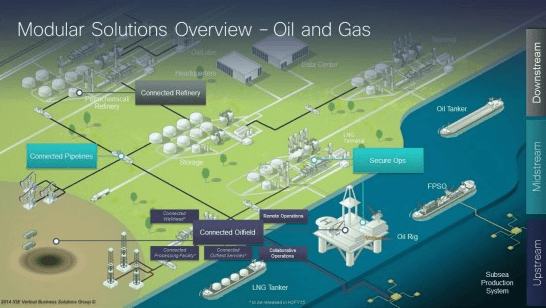By Serhii Konovalov with Jon Judson and Julie Fink-White
With almost a month behind us now into 2017, we are seeing the usual flurry of predictions and “What to Expect in the Oil & Gas Industry” articles across industry blogs and publications. With the shifting geo-political tides across the globe numerous theories abound. So in the spirit of total participation, let me share a few thoughts to cut through the noise on what is ahead for the technological landscape.

I recently represented Cisco at the IHS O&G Digital Oil Field of the Future event in Houston, Texas, where Oil & Gas leaders convened for a lively and spirited dialog. Common threads across the diverse attendees including corporate leaders, technology vendors, and analysts were:
- Price declines have forced the industry to critically evaluate spending – not just where to cut, but where to invest. Organizations have had to make tough choices as they allocate budgets and make strategic choices.
- Prioritization initiatives have ushered in a new era focused on digital transformation and investment in technologies.
- Supported by IHS findings in a recent study, upstream oil and gas organizations have prioritized budget decisions in favor of digital technologies, increasing investments in digital sensing, automation, robots and drones, oilfield mobility and connectivity, data-driven analytics, and AI. “Digital” is now the domain to build and enhance competitive capabilities.
In our own Cisco customer engagements, we’re seeing unprecedented collaboration between oil company operational leaders and information technology teams (OT and IT) like never before. Where embedded silos existed in the past, we’re seeing growth in joint planning and investment to achieve competitive advantage in the marketplace, workforce efficiency, and new levels of safety and compliance.
One of the driving factors we’re watching is the continued deployment of the Internet of Things. As this rolls out, IT and OT integration becomes a critical component, especially when deploying cybersecurity and data platform architectures for distributed applications. Cisco has made this easier with a range of Industry Validated Designs (IVD/CVD) in partnership with the industrial automation community such as the Smart Connected Pipeline strategic alliance with Schneider Electric.

The push for the Internet of Things also belies the need for better data management and the intelligent use of it. Distributed execution of analytics leveraging Fog Computing technologies such as IOx, allow O&G organizations to make operational and safety decisions in the right places at the right time, working around bandwidth constraints and latencies in the oilfield.
The industry’s ongoing adoption of IoT has been incredibly positive. We’re seeing projects ranging from advanced “Rig-of-the-Future” designs that further enhance integrated operations and simplify remote infrastructures. Projects are going towards on-shore digital oilfield projects to optimize electrical submersible pump operation and improving wrench time for contracted workforces.
To learn more about how Cisco innovates and enhances O&G Digital Capabilities to advance the industry in a low-oil-price cycle, please visit:
Tags:

